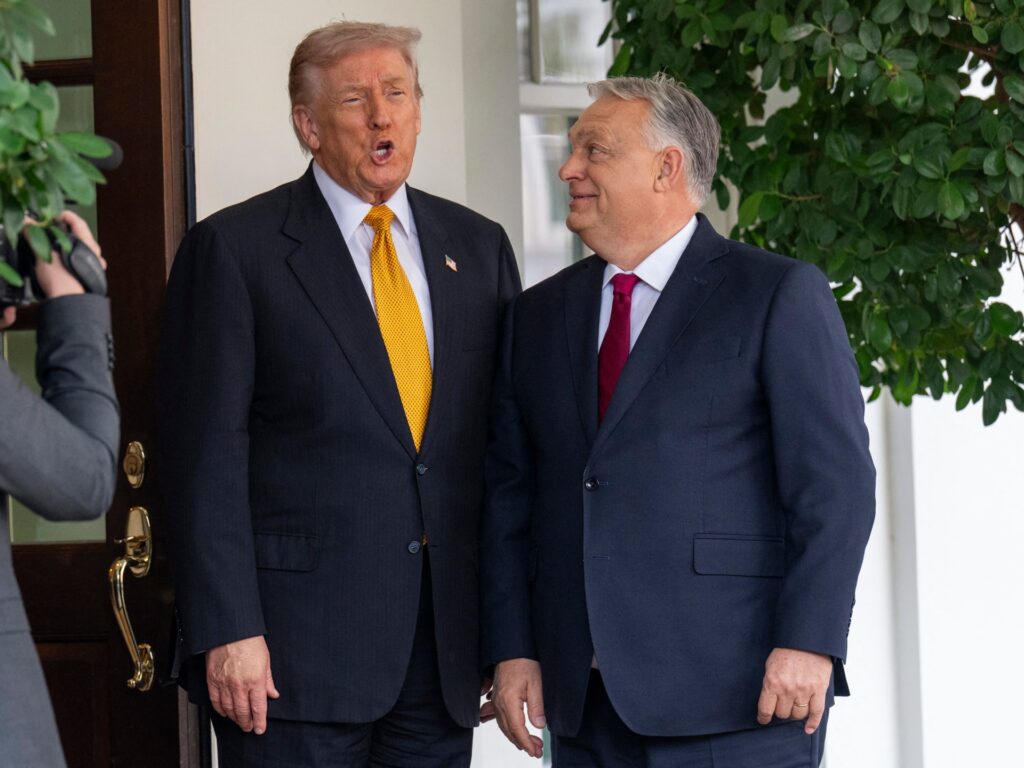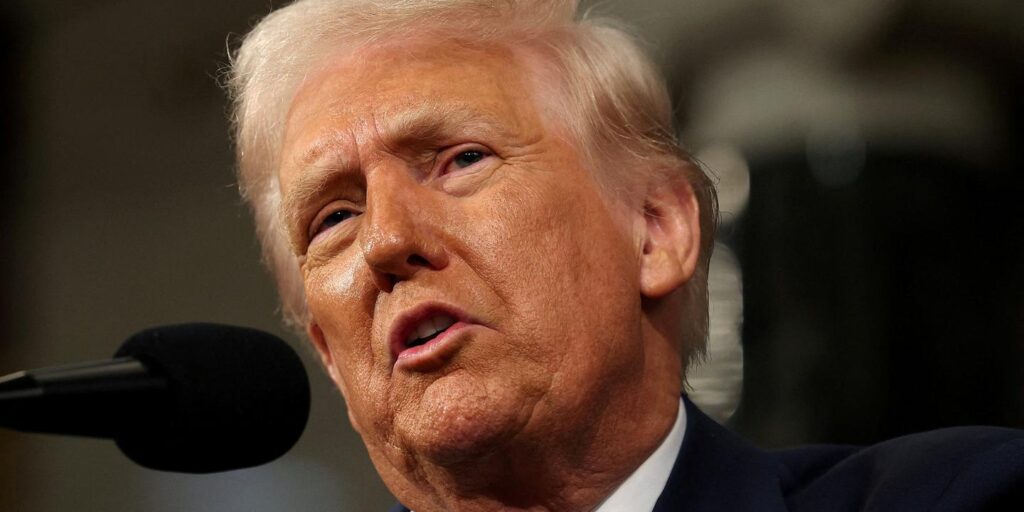Hungary’s Prime Minister Viktor Orban and his very large team of ministers, propagandists and members of the country’s well-connected economic elite flew to Washington on November 7 to meet President Donald Trump, the first bilateral meeting of the two leaders since his return to power. The trip itself was unprecedented in its scale and unusual because of its historical context. A veritable spectacle.
Trump has been pressuring Orban to align with his sanctions on Russian fossil fuels and purchase more American LNG. Trump’s hardening stance towards Russia was a blow to Orban, who has positioned himself as Trump’s closest ally in Europe, ostracised by Western liberals yet on good terms with Moscow and Washington. Initially, his gambit seemed to pay off, as Trump sought a quick end to the war in Ukraine by offering concessions to Russia.
Over time, the classic foreign policy bureaucracy seems to have regained influence and pushed back against Trump’s inner circle around Putin. The latest sanctions and intensified military cooperation signal this shift. Foreign policy discussions in Budapest over the past few weeks have centred on the question of whether, and for how long, Orban can avoid these sanctions and continue buying Russian oil. Thus, the stakes of the meeting were high.
A pyrrhic victory for Orban
The details of the announced deal are still somewhat murky. Orban presented the outcome as a blanket exemption, but Secretary of State Marco Rubio contradicted this, stating that the waiver lasts only one year, while United States officials have flagged to reporters that it has not yet been formalised and remains a verbal understanding. Either way, the imminent threat of financial havoc has apparently been postponed until after the elections in April. Trump also amplified Orban’s misleading messaging about the difficulties of eliminating the country’s dependence on Russian oil. Furthermore, the politicians put the proposed Trump-Putin meeting in Budapest back on the agenda.
Even with all the uncertainties, the deal represents a victory for Orban. He could leverage his American ties and symbolic capital, has another chance to portray himself as a politician punching far above his weight in international politics, and kept Russian oil and the flagship Hungarian energy company’s profits flowing.
However, this is a pyrrhic victory. Costly beyond Orban’s gifts and promises to Trump and his economic commitments made in Washington. And these commitments are not negligible. They range from buying American nuclear fuel – which itself represents a U-turn in Hungarian energy policy that will require a thick skin to sell to a Hungarian audience that has been fed a narrative of no alternative to Russian involvement in Hungarian nuclear energy – to buying US military equipment and liquefied gas.
Orban continues to trade concessions such as procurement and policy alignment for external lifelines rather than building endogenous capacity. However, the real costs are deeper and can be found in three dimensions: moral political costs, economic dependence, and a costly illiberal ecosystem.
The moral and political costs
First, the American green light to Hungary’s continued dependence on Russian fossils has serious moral and political costs. Orban has no qualms about cosying up to war criminals. Still, his ties with Putin carry moral costs at a scale that has profound political implications.
Today, Slovakia and Hungary are the only European Union countries still receiving oil from Russia, with the Hungarian oil giant MOL Group playing a significant role in Slovakia’s energy sector. After Russia launched its full-scale invasion of Ukraine on February 24, 2022, Hungary increased its share of Russian oil imports by 25 percentage points to 86 percent in 2024. Importing Russian oil is profitable for Hungary, allowing for relatively low energy prices, a key pillar in Orban’s illiberal playbook.
It took significant campaigning to convince part of his electorate that Putin is a good guy who makes reduced energy prices possible and protects white Christian conservatism against the “self-sabotaging” “Islamo-communist” West. Most Hungarians are still pro-EU, and appearing as Russia’s Trojan horse is electorally costly. Furthermore, Orban’s Putinism isolated him even among illiberal allies from Warsaw to Rome. Budapest signalled on November 14 that it will challenge the EU’s planned 2027 phase-out of Russian energy, further deepening the political consequences of Orban’s alignment with Moscow.
The exhaustion of Orbanomics
Second, the price Hungary pays for Russian oil is not only measured in roubles flowing East but in euros lost from the West. Despite all the economic nationalist chest-beating, Hungary remains heavily dependent on foreign capital and EU funds. Throughout the 2010s, Orban could get away with his shenanigans in Europe, aided and abetted by mainstream conservatives. Escalating corruption in Hungary and finally Budapest’s doubling down on pro-Russian foreign policy manoeuvres even after the invasion of Ukraine hardened European elites against Orban. Orbanomics emerged as an illiberal response to the internal contradictions of liberal globalism.
Yet, it failed to create a sustainable economic alternative, failed at industrial upgrading and improving domestic capacities, while deliberately repressing wage growth to maintain the country’s cost competitiveness in its low-value assembly platform economy. The “Eastern Opening” gamble also failed to replace Western markets and capital. The political-economic exhaustion of Orbanomics has intensified the Hungarian economy’s external vulnerabilities. One of those vulnerabilities is the loss of EU funds.
A one-year US waiver on Russian oil and gas eases the immediate energy squeeze and props up Orban’s energy politics, but it doubles down on the country’s core weakness: an externally wired, shock-prone model with thin domestic upgrading, wage repression and dependence on foreign monetary goodwill. Hence, continuing to maintain close ties with Putin undermines the country’s economic future.
The architecture of illiberal power
Third, the ties and symbolic capital Orban could leverage in Washington did not appear out of thin air. He was among the first to grasp that for the illiberal right, seizing the state was not enough. Real power requires dismantling liberal hegemony. From 2010 onwards, he launched a counter-hegemonic project aimed at remaking the state, civil society and culture in the service of an alternative order. This project soon reached beyond Hungary’s borders: a small state cannot sustain such ambitions alone.
Orban, therefore, sought to embed Hungary’s transformation within an international illiberal ecosystem, forging ties above all with US national conservatives. Over the past decade, Hungary has poured substantial resources into cultivating these links. Trump and his intellectual circle, in turn, treat Hungary as an illiberal laboratory to justify assaults on higher education, media, civil society and democratic institutions. Orbanism and Trumpism are twin expressions of a deliberate, tectonic revolt against the liberal world order, hence the depth of their ideological bond. Hungary is a “unique island in an ocean of liberalism,” as Orban said after he met with Trump.
Yet their mutual admiration conceals a costly reality: a taxpayer-funded network of foundations, consultancies and media platforms circulating people, ideas and strategies across the illiberal ecosystem. The pyrrhic victory in Washington in November 2025 was the product of this illiberal counter-hegemonic machinery, whose costs are measurable in hundreds of millions of dollars. Yet the same network that delivers symbolic wins and temporary policy concessions also binds Budapest to Trump’s transactional asks.
Rescuing illiberalism?
Thus, the costs of the Trump-Orban deal are significant and manifold. Orban’s request was granted, but it does not fix Hungary’s political-economic vulnerabilities. Nevertheless, Orban achieved a significant short-term victory that could even influence the outcome of the upcoming election next April. With the country’s economy in shambles, averting the financial costs of the sanctions gives Orban’s government a lifeline. It makes some room for pre-election measures to improve Orban’s favourability ratings. These steps allow for the minimising of the costs of the exhaustion of Orbanomics.
Staying in power will require reframing the election so that Orban can reap the domestic benefits of his illiberal international ties. This wouldn’t be a small feat in a politically and linguistically tightly closed country. Nevertheless, in contrast to saving the sinking economy, this foreign policy reframing is feasible before the election. If Trump were to gift Orban a visit in Budapest and maybe even a “peace summit” with Putin, then that could save his loyal Hungarian friend’s political future.
The views expressed in this article are the author’s own and do not necessarily reflect Al Jazeera’s editorial policy.


